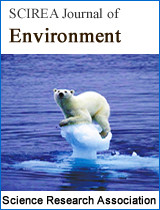Bioacoustic analysis: A tool in discriminating the Mindanao Island river toads, genus Ansonia (Amphibia: Anura: Bufonidae) species complex
DOI: 10.54647/environmental61222 93 Downloads 15966 Views
Author(s)
Abstract
Genus Ansonia of the family Bufonidae, order Anura of amphibians in the Philippines is found only in Mindanao Island. Current classification bares only two species, A. mcgregori and A. muelleri. However, the differences represent individual variation rather than species differentiation. Otherwise proven, these species must be considered conspecific. Thus, there is a need for more evidence other than the morphological characteristics. Bioacoustics, aside from molecular analysis, now provides for distinguishing species which cannot be separated by morphological traits. Moreover, characterization of these species complex as to bioacoustics is still dearth or has not been established yet. This study recorded vocalizations of the Ansonia spp. in eight rivers in Mindanao. Analyses of the recorded vocalizations made use of oscillograms (waveforms), audiospectograms (sonograms), and results of the Fast Fourier Transformation (FFT: frequency spectrum) for a variety of temporal and spectral characters using Raven Pro 1.4 for Windows (2011) considering some ecological and morphological features. Results bared that call duration, interval, calling rate, number of calls per minute and peak call frequency varied where some of which were influenced by some ecological factors and body sizes. These could serve as a basis for reassessment on the classification of Ansonia spp.
Keywords
conspecific, call characteristics analysis
Cite this paper
Nelieta B. Arnejo Bedoya,
Bioacoustic analysis: A tool in discriminating the Mindanao Island river toads, genus Ansonia (Amphibia: Anura: Bufonidae) species complex
, SCIREA Journal of Environment.
Volume 5, Issue 3, June 2021 | PP. 63-73.
10.54647/environmental61222
References
| [ 1 ] | Bioacoustics Research Program. 2011. Raven Pro: Interactive Sound Analysis Software (Version 1.4) [Computer Software]. Ithaca, NY: The Cornell Lab of Ornithology. Available from http://www.birds.cornell.edu/raven. |
| [ 2 ] | Bosch, J and I. De la Riva. 2004. “Are frog calls modulated by the environment? An analysis with anuran species from Bolivia”. Ca. J. Zool. 82(6):880-888 (2004) /doi.10.1139/z04-060/ @ 2004 NRC Canada. Accessed online: August, 2015. |
| [ 3 ] | Brown, R. M., C. N. Dolino, E. Alcala, A. C. Diesmos, and A. C. Alcala. 2002 (2003). The advertisement calls of two endangered species of endemic Philippine frogs: Platymantis spelaeus and P. insulatus (Anura; Ranidae). The Silliman Journal. [PDF] |
| [ 4 ] | Brown, R. M., J. Foufopoulos and S. J. Richards. 2006. “New Species of Platymantis (Amphibia; Anura; Ranidae) from New Britain and Rediscription of the Poorly Known Platymantis nexipus”. Copeia, 2006 (4), pp. 674-695. |
| [ 5 ] | Brown, R. M. and S. J. Richards. 2008. “Two new frogs of the genus Platymantis(Anura: Ceratobatrachidae) from the Isabel Island group, Solomon Islands”. Zootaxa 1888: 47–68. [PDF] |
| [ 6 ] | Diesmos, A. C., A. C. Alcala, R. M. Brown, L. Afuang, G. Gee, K. Hampson, M. L. Diesmos, A. Mallari, P. Ong, D. Ubaldo and B. Gutierez. 2004. Ansonia muelleri. In: IUCN 2008. 2008 IUCN Red List of Threatened Species < www.iucnredlist.org>. Accessed online: January 12, 2013. |
| [ 7 ] | Diesmos, A. C., R. M. Brown and A. C. Alcala. 2002. “New species of narrow-mouthed frog (Amphibia; Anura; Microhylidae; Genus Kaloula) from the mountains of Southern Luzon and Polilio Islands, Philippines”. Copeia, 2002 (4), pp.1037-1051. |
| [ 8 ] | Frost, D. 2009. Amphibian Species of the World: An Online Reference, Version 5.3. http://research.amnh.org/herpetology/amphibia/references.php?id=2203. Accessed online: January 12, 2013. |
| [ 9 ] | Hsu, M.Y., Y. C. Kam and G. M. Fellers. 2006. Temporal organization of an anuran acoustic community in a Taiwanese subtropical forest”. Journal of Zoology 269 (2006) 331-339. ISSN 0952-8369. |
| [ 10 ] | Malkmus, R., U. Manthey, G. Vogel and J. Kosesch. 2002. Amphibians and reptiles of Mt. Kinabalu (North Borneo): North Borneo, Published by Koeltz Scientific Books. ISBN 3904-144839, 9783904144834 (Accesed online: November 10, 2013). |
| [ 11 ] | McClelland, B. E., W. Wilczynski and M. J. Ryan. 1996. “Correlations between call characteristics and morphology in male cricket frogs (Acris crepitans)”. The Journal of Experimental Biology 199, 1907–1919 (1996) 1907. Printed in Great Britain © The Company of Biologists Limited 1996. |
| [ 12 ] | Preininger, D., M. Bockle and W. Hodl. 2007. “Comparison of anuran acoustic communities of two habitat types in the Danum Valley Conservation Area, Sabah, Malaysia. Salamandra 43 (3) 129-138, Rheinbach, 20 August 2007. ISSN 0036-3375. http://www.salamandrajouirnal.com |
| [ 13 ] | Roy, D. 1994. “Development of hearing in vertebrates with special reference to anuran acoustic communication”. J. Biosci., Vol. 19, No. 5, Dec. 1994, pp629-644. Printed in India. |
| [ 14 ] | Roy, D. and A. Elepfandt. 1993. “Bioacoustic analysis of frog calls from Northeast India”. J. Biosaci., Vol. 18, No. 3, September 1993, pp381-393. Printed in India. |
| [ 15 ] | Sanguila, Marites Bonachita, Cameron D. Siler, Arvin C. Diesmos, Olga Nuñeza and Rafe M. Brown. 2011. “Phylogeography, geographic structure, genetic variation, and potential species boundaries in Philippine slender toads”. ScienceDirect. Molecular Phylogenetics and Evolution journal homepage: www.elsevier.com/locate/ympev. |
| [ 16 ] | Stuart, B. L. and R. H. Bain. 2008. “Amphibian species discovery in Mainland Southeast Asia”. p83 In: Stuart, S.N., Hoffmann, M., Chanson, J.S., Cox, N.A., Berridge, R, Ramani, P. and Young B.E. (Eds.) Threatened Amphibians of the World. Lynx Ediciones, Barcelona, Spain; IUCN - The World Conservation Union, Gland, Switzerland; and Conservation International, Arlington Virginia, USA. [PDF] |
| [ 17 ] | Trepanier, T. L., A. Lathrop and R.W. Murphy. 1999. “Rhacophorus leucomystax in Vietnam with acoustic analyses of courtship and territorial calls”. Asian Herpetological Research, Vol. 8, pp102-106, 1999. |

